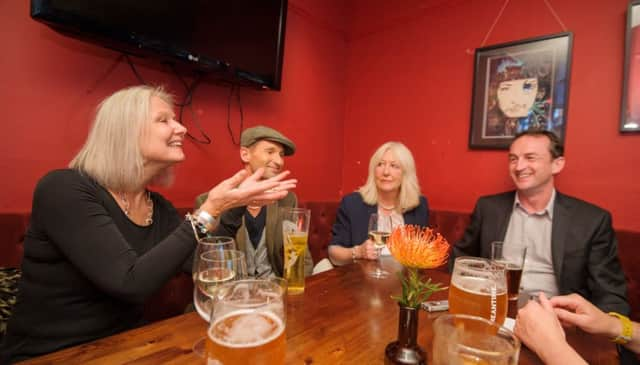Scottish independence vote is talk of London town


“Most people I’ve spoken to about this are not Scottish and they are either indifferent or complacent,” says Murray Buchan, who has lived in London since 1998.
“There’s no in between. These are my Scottish friends and suddenly we have started to care very much.”
Advertisement
Hide AdAdvertisement
Hide AdBeside Buchan sit Christine Yorkston and Hilary Johnston, both of whom have lived in London for 40 years. David Walker, an old friend of Buchan’s, has lived in the city for 14 years.
They all choose to live in London. They came to the city for jobs, or love. But they still speak with Scottish accents and are gripped by these last days of the campaign, even though none of them can vote.
“I’m starting to feel quite ill about it,” says Yorkston. “I’m so anxious.”
“There’s both fear and hope,” Walker adds.
Close to 700,000 Scots live in England. Before last week, when the entire London-based broadcast media suddenly grasped what was happening and decamped to Scotland, the independence referendum had been largely ignored.
“It has felt as though the issue has been dismissed,” says Yorkston. She has had three main responses when the indyref has come up in conversation: friends have said the idea of Scotland leaving makes them sad, or they think Scotland should take its chance. “Sometimes it’s been ‘how could you be so stupid as to do this?’
“We London Scots don’t have the benefit of being around people who have a vested interest in the debate – the people who will be voting.”
In Scotland the vote has long occupied conversations and column inches, but in London things are catching up. Whether feeding the ducks or walking the dog, a Scottish accent entices people to ask: “What do you think will happen?”
Advertisement
Hide AdAdvertisement
Hide AdAt the duck pond, it was a well-heeled Englishman who inquired. “It’s going to be interesting,” I said. “You?”
“I think it’s close,” he said. “I do some work for RBS so I’m in Edinburgh a bit. When I read what Boris Johnson and that lot have said, there couldn’t be a worse thing – toffee-nosed politicians patronising the Scots. If nothing else would make people vote yes, that would.”
On the dog walk, it was a man with his first can of Strongbow already close to gone. As I shouted for my dog to come back, the man who was stroking stood up. “No wonder she likes me,” he said. “I’m Scottish. What you thinking about the vote?” “I think it’s going to be tight,” I said. “Are you for or against?”
“Might as well go for it,” he said. “What have we got to lose?”
Back in Crouch End, a similar sentiment is expressed. Walker uses the phrase ‘skin in the game’. “It’s an expression the Americans at work use,” he says. “It means you’ve got something to lose. We don’t have skin in the game, we can get excited about the idea of independence but we don’t have to worry about the value of our house.
“How would I feel if I was waking up next Friday worrying about what my bank account was going to look like?” A silence settles around the table. “Nothing is certain,” says Walker.
“Can you guarantee that the UK will be in Europe in 2020, that more powers will be devolved to Scotland in the event of a no vote. No. Change always produces instability. Something better might come out at the end of it.”
For Yorkston, the anti-Westminster sentiment, which has at times segued into anti-London feeling, has been uncomfortable. “This is not about Scotland voting for particular policies but about having the chance to vote for autonomy to create their own policies. That’s not about rejecting England. I like the notion of inter-dependence rather than independence.”
Advertisement
Hide AdAdvertisement
Hide Ad“A lot of people are scared about the uncertainty,” says Buchan, who is still unsure of which way he would vote. “Initially I was part of that. I thought, if it ain’t broke, don’t fix it. In the last two weeks I’ve thought, come on guys, grab it if you want it.”
SEE ALSO